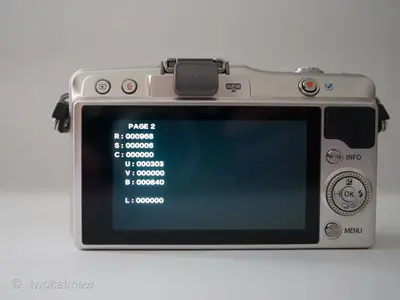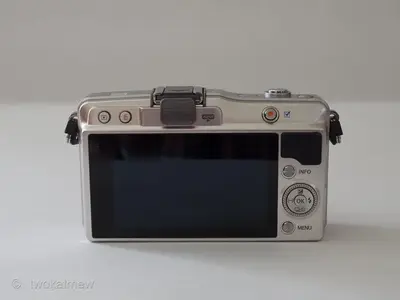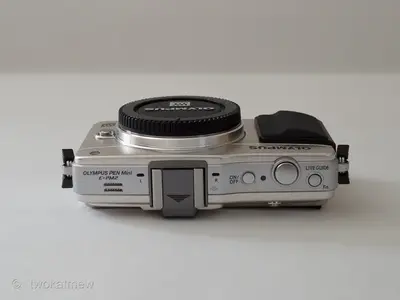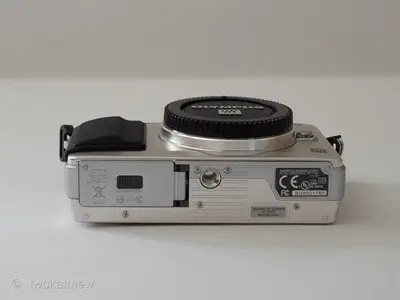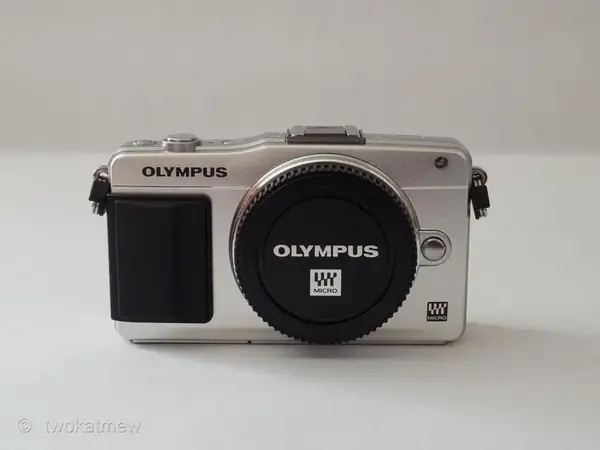
Olympus PEN E PM2
| Brand | Olympus 2012 |
| Model | E-PM2 BODY SLV |
| Released Year | 2012 |
| Type | Mirrorless Cameras |
| Color | Silver |
| Compatible Mountings | Micro Four Thirds |
| Autofocus | Contrast-detection autofocus with 35 focus points |
| Photo Sensor Resolution | 16 MP |
| Video Resolution | 1080p |
| Optical Zoom | 1 x |
| File Format | RAW, JPEG, RAW+JPEG, MPO(3D still) |
| Status | Discontinued |
Quick view
Overview
The Olympus PEN E-PM2 is a compact mirrorless camera introduced in 2012, featuring a 16-megapixel Micro Four Thirds Live MOS sensor offering high resolution and excellent image quality. It utilizes the TruePic VI image processor which enables faster autofocus and improved noise reduction for clear images even at high ISO values. The camera supports interchangeable Micro Four Thirds lenses, providing versatility for different shooting conditions. It features 35 focus points with contrast-detection autofocus for precise subject tracking and manual focus assistance. Video recording includes Full HD 1080p at 30fps with stereo sound recording. Connectivity options include HDMI output and USB 2.0 for image transfer and tethered shooting.
Designed for beginner to enthusiast photographers, the Olympus PEN E-PM2 incorporates a 3.0-inch LCD tilt screen for flexible composition and W-Fi with optional adapter support for wireless image transfer. Its compact body includes customizable controls and various shooting modes including art filters for creative effect. Powered by a lithium-ion rechargeable battery, the camera balances performance and portability effectively.
Specifications
| Built-In Media | SD Card |
| Are Batteries Included | No |
| Remote Included | No |
| Series Number | 1 |
| Global Trade Identification Number | 00050332184312 |
| UPC | 050332184312 |
| Item Height | 2.52 inches |
| Manufacturer | Olympus |
| Screen Size | 3 Inches |
| Display Type | LCD |
| Dots Per Screen | 460000 |
| Display Fixture Type | Fixed |
| Touch Screen Type | Yes |
| Display Resolution Maximum | 460000 |
| Has Color Screen | Yes |
| Flash Memory Type | SD/SDHC/SDXC |
| Write Speed | Fast |
| Flash Memory Bus Interface Type | SDIO |
| Compatible Mountings | Micro Four Thirds |
| Sensor Type | CMOS |
| Image stabilization | Sensor-shift |
| Expanded ISO Minimum | 200 |
| Photo Sensor Resolution | 16 MP |
| Photo Sensor Size | Four Thirds (17.3 x 13 mm) |
| Maximum Shutter Speed | 1/4000 Seconds |
| Minimum Shutter Speed | 60 seconds |
| Form Factor | Mirrorless |
| Special Feature | Lightweight |
| Color | Silver |
| Item Weight | 9.44 ounces |
| Video Resolution | 1080p |
| Viewfinder | None (relies on 3.0-inch rear LCD) |
| Flash Modes | Auto, On, Off, External Flash |
| Camera Flash | Built-In |
| Skill Level | Professional |
| Specific Uses For Product | Videography, Photography |
| Compatible Devices | Micro Four Thirds mount devices |
| Continuous Shooting | Up to 8.5 frames per second |
| Aperture modes | Aperture priority |
| Flash Sync Speed | 1/250 sec |
| Video Capture Format | AVC, AVI, MJPEG, MPEG-4 |
| Expanded ISO Maximum | 1600 |
| Audio Output Type | internal |
| Battery Average Life | 360 Photos |
| Battery Type | Lithium-Ion BLS-5 rechargeable battery & charger |
| Processor Description | truepic 6 |
| Water Resistance Level | Not Water Resistant |
| Supported Audio Format | AAC, WAV, MP3 |
| Aspect Ratio | 16:9 |
| File Format | RAW, JPEG, RAW+JPEG, MPO(3D still) |
| Effective Still Resolution | 16.1 MP |
| Supported Image Format | JPEG, RAW |
| Total Still Resolution | 16 MP |
| Optical Zoom | 1 x |
| Lens Type | Mirrorless Lens" or "Micro Four Thirds Lens |
| Camera Lens | A high-quality mirrorless lens suitable for the Micro Four Thirds system, known for its compact size and versatility. |
| Metering Methods | Multi, Center-weighted, Spot |
| Exposure Control | Aperture priority, Automatic, Program AE, Shutter priority |
| White Balance Settings | Flash torch |
| Connectivity Technology | HDMI, USB |
| Wireless Technology | EyeFi |
| Video Output | HDMI |
| Total USB 2.0 Ports | 1 |
| Total USB Ports | 1 |
| Total Video Out Ports | 2 |
| Shooting Modes | Automatic, Program AE, Aperture Priority, Shutter Priority |
| Digital-Still | Yes |
| Movie Mode | Yes |
| Image Capture Type | Stills & Video |
| Night vision | No |
| Auto Focus Technology | Continuous, Contrast Detection, Face Detection, Live View, Multi-area, Selective single-point, Single, Touch, Tracking |
| Focus Features | Contrast Detection |
| Autofocus Points | 35 |
| Focus Type | Auto Focus |
| Focus Mode | Single-Servo AF (AF-S) |
| Autofocus | Contrast-detection autofocus with 35 focus points |
| Camera Type | Mirrorless Interchangeable Lens Camera |
| Sensor | 16 MP Live MOS sensor, Micro Four Thirds |
| Image Processor | TruePic VI |
| Lens Mount | Micro Four Thirds |
| ISO Sensitivity | ISO 100–25600 |
| LCD Screen | 3.0-inch tilting LCD, 460,000 dots |
| Shutter Speed Range | 1/4000 to 60 seconds |
| Video Recording | Full HD 1080p @ 30fps, stereo sound |
| Flash | Built-in pop-up flash |
| Connectivity | HDMI, USB 2.0, optional Wi-Fi adapter |
| Battery | Lithium-ion rechargeable battery (approx. 350 shots) |
| Dimensions | 110 x 64 x 38 mm |
| Weight | 332 grams (body only) |
| Storage Media | SD/SDHC/SDXC card |
Images
Key Advantages
The Olympus PEN E-PM2 offers a lightweight and compact design making it highly portable for everyday use and travel photography. It provides a high-resolution 16MP sensor that delivers sharp, detailed images with vibrant color reproduction. The TruePic VI image processor enhances autofocus speed and image quality, especially in low-light conditions. Its Micro Four Thirds lens mount allows users to access a vast array of high-quality lenses tailored to multiple photography styles. The tilting 3-inch LCD screen enables creative shooting angles and improved visibility when framing shots. Additionally, the optional Wi-Fi adapter facilitates easy sharing and remote control, expanding the camera's connectivity options.
Limitations
While compact, the PEN E-PM2 lacks a built-in electronic viewfinder, requiring reliance on the rear LCD which may be challenging in bright light. The autofocus system, though improved, is contrast-detection only and generally slower than hybrid or phase-detection systems found in newer models. Battery life is moderate, averaging around 350 shots per charge, which might necessitate carrying spares for extended sessions. Video functionality is limited to 1080p at 30fps without advanced options like 4K or higher frame rates. The LCD screen, while tilting, does not fully articulate or offer touch capabilities, restricting user interface flexibility. Lastly, the camera’s connectivity options depend on an optional Wi-Fi adapter, not integrated, which can be inconvenient for wireless use.
FAQ
What sensor does the Olympus PEN E-PM2 use?
The Olympus PEN E-PM2 uses a 16-megapixel Micro Four Thirds Live MOS sensor.
Does the E-PM2 have a built-in electronic viewfinder?
No, the Olympus PEN E-PM2 does not have a built-in electronic viewfinder and relies solely on its rear LCD screen.
What type of lenses are compatible with the Olympus PEN E-PM2?
The camera is compatible with Micro Four Thirds mount lenses.
Can the Olympus PEN E-PM2 record video?
Yes, it supports Full HD 1080p video recording at 30 frames per second with stereo sound.
Does the E-PM2 support wireless connectivity?
It supports wireless connectivity via an optional Wi-Fi adapter; Wi-Fi is not built-in.
What is the battery life of the Olympus PEN E-PM2?
The battery life is approximately 350 shots per charge under typical usage.
Is the LCD screen on the PEN E-PM2 touch-enabled?
No, the 3-inch LCD tilt screen is not touch-sensitive.
Disclaimer
The content on is provided for general informational purposes only. We do not guarantee the accuracy, completeness, or reliability of any information, specifications, or visuals presented on the site.
is not responsible for any content, images, or data uploaded or shared by users. Users are solely responsible for the content they submit.
We may include links to third-party websites for convenience. We do not endorse or take responsibility for the content or policies of any external sites.
Use of the site is at your own risk. Always verify critical information independently before making decisions based on content from this website.

